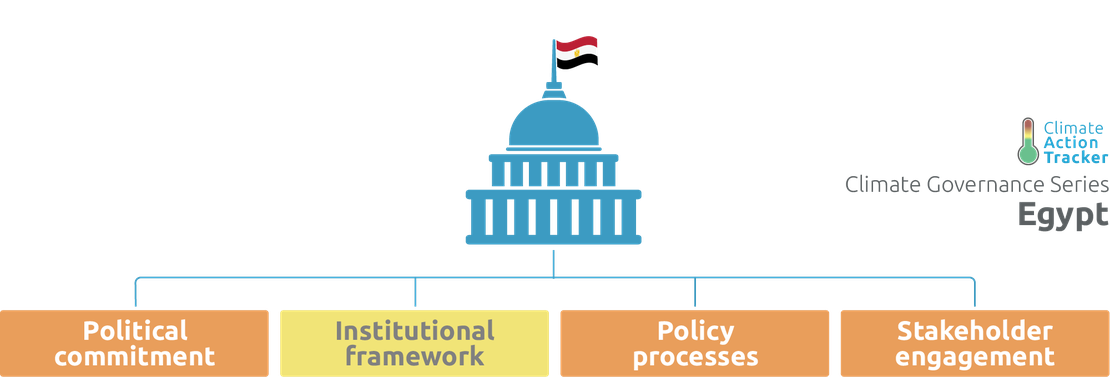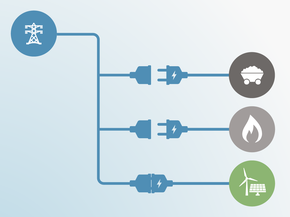Governance

Climate Governance Series
In March 2022, the CAT released its assessment of Egypt’s climate governance readiness. A summary of the report is below. The full report is available here.
Egypt country profile
President El-Sisi has not been a strong advocate of the need to transition the Egyptian society and economy towards net zero emissions.. He has traditionally focused on the importance of climate adaptation and emphasised the need for climate finance from developed countries. More broadly, expanding the country’s fossil gas production is a top priority for government officials, both for the country’s own energy security and as a valuable export commodity, not starting on the path to decarbonisation.
While the climate change lead agency is entrusted with clear legal mandates, it needs greater power to reinforce its position as the lead institution on climate change issues in Egypt.
There is incremental improvement in Egypt’s climate policy development, but the process is slow. And, there have been some notable rollbacks, including measures adopted in response to the fuel shortages the country experienced a decade ago, and more recent measures that may dampen the speed of renewable energy uptake.
The trustworthiness and the accountability of Egypt’s government is considered to be low both generally and in relation to environmental governance metrics, which may inhibit the transition. Constitutional addendums passed in 2019 mean that the President could stay in power until 2030. The extent to which there is broadscale political support for the transition to a zero emissions society is somewhat moot against such a backdrop.
The National Council for Climate Change (NCCC) is an inter-ministerial committee and the key-decision body responsible for coordinating climate policy development and implementation across ministries and agencies. Assessing its effectiveness is difficult as information on the workings of the Council is limited. Transition-related policy development also appears to be taking place in other settings, with the link to the NCCC unclear. Coordination with subnational governments is poor as there are no climate specific coordination mechanisms.
Mainstreaming the concept of a transition to a zero emissions society within government is in its infancy as Egypt has only recently begun to consider the need for such a transition. Egypt announced its 2050 National Climate Change Strategy (NCCS) in November 2021 and launched it in May 2022. Egypt’s numerous policies and strategy documents are generally aligned, though these are not transition focused and not updated frequently.
Egypt does not have an authoritative body with an explicit mandate to provide the government with transition-related advice, though some agencies may be capable of playing such a role. The government does consider external advice as part of its policy-development process.
While the country has a high level of climate finance readiness in some areas, the financial and technical resources of the Ministry of Environment need to be improved. Some specific technical capacities within the Ministry are lacking, such as GHG inventory preparation and funding proposals preparation, so it relies on external consultants. However, overall the Ministry is run by well-qualified staff who enable the lead agency, Egyptian Environmental Affairs Agency (EEAA), to build continuous institutional learning.
Egypt’s processes to develop, implement and track the policies needed to enable the transition are weak. The country has not adopted a net zero target, nor has it set out a pathway to achieve it.
The country’s existing legal architecture is comprised of piecemeal sectoral legislation which may help climate mitigation, but it lacks comprehensive, climate-focused legislation to support the transition. A legislative review is underway to include climate change in all relevant laws, though no timeline for its completion has been given. Implementation of existing regulations has also been problematic: enforcement of building sector energy use and efficient regulations are a case in point.
Egypt does not have a comprehensive transparency framework. A proposal was developed a few years ago, but it has not yet been adopted by the government. GHG inventories are an exception, with evidence of improvement at the national and sub-national level. Egypt has not established a formal review mechanism for transition-related policies, nor is there evidence of any domestic ratchet-up mechanism.
Stakeholders are consulted as part of the decision-making process; however the scope and the depth of those consultations is difficult to gauge. Consultations take place against a backdrop of low levels of public understanding of climate change - only about 40% of Egyptians consider that they know at least a moderate amount about climate change. Civil society is active in the climate space, but often faces capacity limitations, and recent legislative reforms have curtailed the ability of these groups to function.
Egypt lacks a comprehensive strategy to ensure a Just Transition, but has had some success with the phasing out of its energy subsidies and the promotion of green jobs. The full phase-out of consumption subsidies has been pushed back to mid 2025, due, in part, to concerns of rising consumer prices.
The military is heavily involved in Egypt’s economy, especially in major public infrastructure projects, which likely lessens the effect non-state actors can have on the government compared to other countries. This involvement is in activities that both support and potentially hinder the transition.
As the COP27 host in 2022, there was the potential for Egypt to improve on a number of governance metrics. However, the NDC submitted in July 2023 offered little improvements.
Further analysis
Latest publications
Stay informed
Subscribe to our newsletter





